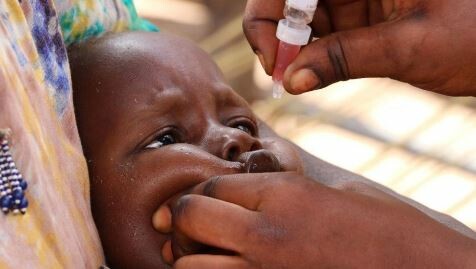A polio vaccination campaign was launched in the disputed territory of Abyei on Thursday, but efforts are being hampered by significant challenges, including flooding and security concerns along the Abyei-Twic border.
Dr. Rou Manyiel, the Minister of Health and Environment for Abyei, told Radio Tamazuj on Friday that, while the campaign is underway, reaching remote areas remains a priority for the ministry.
“The polio campaign has started, and health workers will cover Abyei and surrounding areas as part of a crucial national initiative for community health,” Dr Manyiel said. He acknowledged several obstacles complicating the comprehensive coverage of the region during the campaign.
“We face multiple challenges in the Abyei Ministry of Health, particularly during the polio campaign,” he explained. “First, road accessibility is severely limited due to flooding, making it difficult for health workers to reach children in remote villages.”
Dr. Manyiel also cited delays in funding from Juba as another challenge, which he said has prevented the timely launch of the campaign that was initially scheduled for last week.
A third major hurdle, he said, is the ongoing insecurity between the Dinka Ngok and Twic communities in Warrap State. This insecurity has complicated vaccination efforts in southern Abyei, where many children need immunization, he added.
Dr. Manyiel emphasized that all children under the age of five are eligible to receive the polio vaccine and added that the timeline for completing the campaign might be extended if health workers cannot meet their targets promptly.
He urged community leaders to assist by gathering children in central locations to streamline the vaccination process.
Separately, Dr. Manyiel expressed concern about the potential for a cholera outbreak in Abyei, especially given the recent cases in neighbouring Sudanese states, such as the Kordofan region. He noted that the influx of refugees and returnees could increase the risk of a cholera outbreak.
Bulabek Deng Kuol, the paramount chief of the Ngok Dinka in Abyei, called on parents to bring their children to vaccination points, emphasizing the importance of immunization for the future of South Sudan.
“Vaccination against polio is essential for human life,” Chief Deng stated. He urged all chiefs in Abyei to help educate families about the significance of the vaccination and encourage mothers to bring their children, aged five and below, for immunization.
“These children are the future of South Sudan; some will become leaders, traders, farmers, and defenders of the nation,” he added. “I implore all chiefs and elders to support the polio campaign so health workers can complete their mission.”




